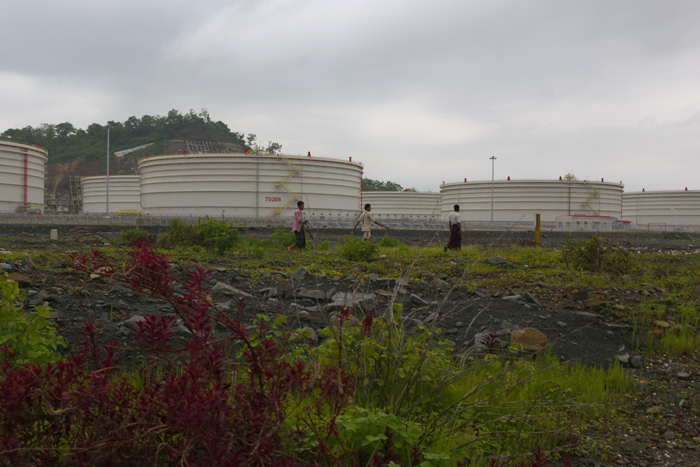
Real Reform Requires Transforming Myanmar’s State-Owned Companies
Note: This article originally appeared as an op-ed in The Myanmar Times on 26 January 2016 in connection with the release of new research from NRGI.
Myanmar's state-owned economic enterprises (SEEs) control vast amounts of public money. In recent years, more than 60 percent of all money collected by the Union government has passed through the SEEs. That means that every time the government builds a hospital, paves a road or pays a teacher’s salary, chances are some of the money it uses has transited through an SEE before reaching the state budget. What’s more, some of these companies appear to be amassing large sums of money – at levels reaching trillions of kyat – in opaque accounts not subject to ordinary budget processes. If the incoming National League of Democracy government wants to make meaningful progress in improving public sector performance, it will have to tackle SEE reform head-on.
Nowhere is the importance – or the challenge – of SEE management clearer than in the oil and gas sector. This industry has the potential to be a driver of economic growth, but is prone to volatility and corruption. While Myanmar’s continued economic opening should attract more investment in this sector, oil and gas SEEs already wield outsized influence over public finances. MOGE (Myanma Oil and Gas Enterprise, responsible for the upstream oil and gas sector), MPE (Myanmar Petrochemical Enterprise, responsible for the downstream) and MPPE (Myanmar Petroleum Products Enterprise, responsible for the distribution of petroleum products) are together expected to collect 19pc of all public revenues and account for 14pc of all public expenditures, according to this year’s budget.

Photograph by Yu Yu Myint Than for NRGI
The biggest of these powerful entities is MOGE, which oversees licensing and compliance in Myanmar’s oil and gas fields. Its impact on the national budget is unparalleled: Figures from the Ministry of Finance indicate that in 2012-13 MOGE collected 16pc of public revenues and executed more than 10pc of public expenditure.
While MOGE earns its money primarily through its participation in production-sharing contracts with private and international oil companies, the precise composition of its revenues remains unclear. Also unclear is exactly what MOGE is doing with all the money it is spending.
As with SEEs in other industrial sectors, the government has given MOGE greater autonomy over time, including over its own finances. According to the Ministry of Finance, after paying 45pc of net profits into the main “State Account” and paying for (relatively minor) raw materials costs, each SEE is allowed to park the rest of its revenues in company-specific “Other Accounts”. The recently released first report of the Myanmar Extractive Industry Transparency Initiative (MEITI) indicates that in fiscal year 2013-14 alone, MOGE deposited more than US$1.4 billion into its Other Accounts.
This sum is more than the total amount the Myanmar government spent that year on health ($750 million) and about as much as it spent on education ($1.1 billion) for the whole country. The total sum that has accumulated in MOGE’s Other Accounts over many years remains unknown.
We don’t know what MOGE does with this money. Is it simply leaving the money in an account? Is it using the money to finance other investments? There is no clear answer. The stated purpose of the transfers to the Other Accounts is to allow SEEs to accumulate revenues over time so as to eventually “stand on their own feet.” This model, by which the company can gradually build up a reserve account, may be more appropriate for SEEs in other sectors, charged with creating value through productive activity and responsible for smaller sums. It appears to be less fitting for extractive industry SEEs, which receive massive cash flows through the sale of public resources.
Even more worrying, there are only weak formal controls over the management of these natural resources and the revenues they generate. MOGE and Myanmar’s other extractive SEEs are not subject to rigorous intra-governmental oversight. Government sources have told us that there is some degree of control over how the SEEs may spend the money in these Other Accounts, but the exact nature of this control is unclear. And the Ministry of Finance has had much more difficulty in obtaining information on detailed activities and expenditures from the SEEs than from other government agencies responsible for public money. The lack of strong oversight also weakens the incentives of SEEs to become more efficient companies.
Reforming MOGE and other oil, gas and mining SEEs is critical if the incoming NLD leadership is to achieve the ambitions expressed in its election manifesto to “establish a public financial management system that is transparent” and to “ensure that extractive projects are planned transparently and that the public is informed”. Top priorities should include re-examining the SEEs’ level of control over public revenues, strengthening requirements for the SEEs to report to the Ministry of Finance, clarifying SEE roles and responsibilities under law, and publishing more information on what SEEs are doing with the money in their Other Accounts.
Golden opportunities for reform exist. The release of the first MEITI report represents an important step toward greater openness, and Myanmar can learn from the examples of state-owned companies in countries as diverse as Malaysia and Colombia, which have developed strong corporate governance standards and well-articulated commercial strategies. But the path to progress is littered with obstacles, and it will be important for the new government to be ambitious and persistent.
Patrick Heller is the director of legal and economic programs at the Natural Resource Governance Institute, an independent non-profit organization that helps people realise the benefits of their country’s oil, gas and mineral wealth. He is the co-author of Gilded Gatekeepers: Myanmar’s State-Owned Oil, Gas and Mining Enterprises.
Authors

Patrick Heller
Chief Program Officer